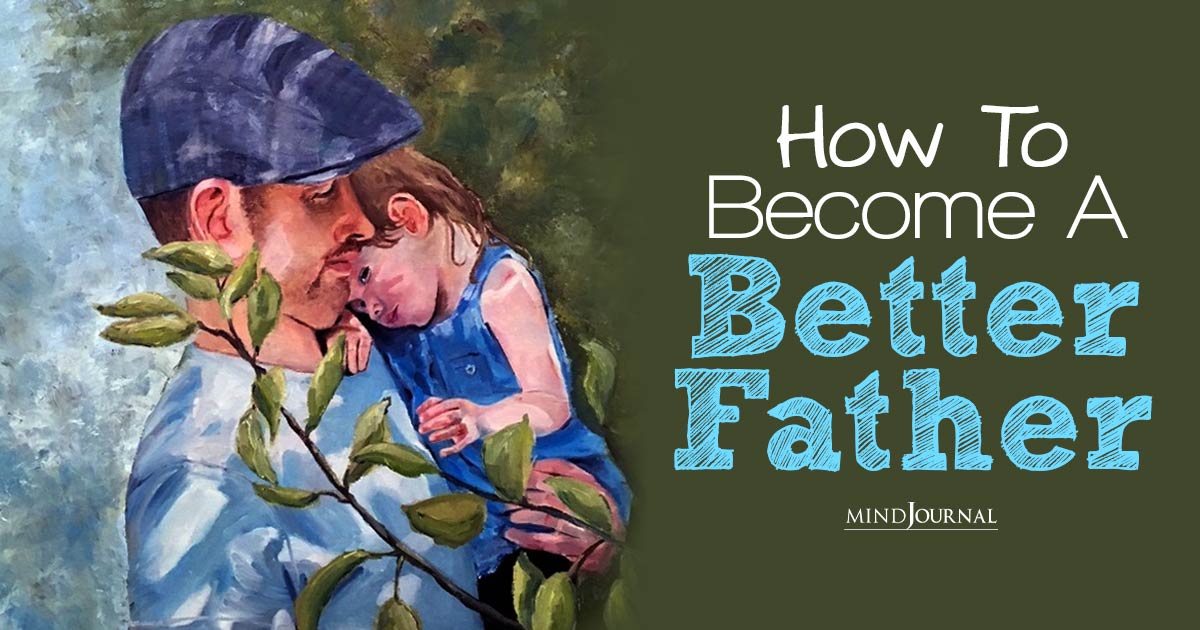Wondering how to become a better father? It’s a question that has echoed through the ages, as fathers play a vital role in shaping the lives of their children.
The journey of fatherhood is a unique and rewarding experience that requires patience, love, and a deep commitment to personal growth. Let us explore the essence of a good father and provide actionable tips on being a good father.
Whether you are a new dad or have been on this journey for a while, this guide will serve as a compass to help you navigate the challenges and joys of fatherhood.
Who is a Good Father?

A good father is more than just a provider or disciplinarian. He is a loving and nurturing presence in his children’s lives. A good father listens, supports, and guides his children and family through life’s ups and downs.
He leads by example, instilling values, and teaching important life lessons. A good father creates a safe and secure environment where his children can grow, learn, and flourish.
Related: 4 Types Of Parenting Styles In Psychology: What Kind Of A Parent Are You?
9 Pieces of Advice On How to Become a Better Father
Do you know how to level up as a dad? Let’s delve into some actionable tips and heartfelt advice for becoming the best father you can be –
1. Prioritize Quality Time
In today’s fast-paced world, it’s easy to get caught up in work and other responsibilities. However, making time for your children is crucial. Set aside dedicated quality time to engage with your children and create lasting memories.
This could involve playing games, reading together, or simply having heart-to-heart conversations. By showing genuine interest in their lives, you strengthen the bond between you and your children.
2. Active Listening
Being a good father is all about active listening, which is a powerful tool for any father. Practice active listening by giving your full attention when your child is speaking. Encourage open communication without judgment, allowing them to express their thoughts and feelings.
By actively listening, you demonstrate respect and validate their experiences, fostering a healthy parent-child relationship built on trust.
3. Foster Emotional Intelligence
Help your children develop emotional intelligence by teaching them to recognize and manage their emotions. Encourage them to express their feelings and provide guidance on appropriate ways to handle challenging situations.
By promoting emotional awareness, you equip your children with essential skills that will serve them well throughout their lives. This is how to become a better father.
4. Lead by Example
Children often learn by observing their parents’ behavior. As a father, it is vital to lead by example and model the qualities you want your children to embrace. Display honesty, integrity, empathy, and responsibility in your actions.
By embodying these values, you create a positive influence that will shape your children’s character.

5. Be Involved
Actively participate in your children’s lives. Attend school events, extracurricular activities, and parent-teacher meetings. Engage in their hobbies and interests, showing genuine curiosity and support.
Your involvement demonstrates that you value their passions and reinforces the notion that you are always there for them.
Related: Bad Husband But Good Father? 8 Tips On How To Be A Better Dad And Husband
6. Show Unconditional Love
One of the greatest gifts a father can give his children is unconditional love. Express your love verbally and through meaningful gestures. Let your children know that you love them for who they are, regardless of their achievements or mistakes.
This unwavering support builds their self-esteem and provides a secure foundation from which they can explore the world.
7. Discipline with Compassion
Discipline plays a crucial role in a child’s development. However, it is essential to discipline with compassion. Set clear boundaries and expectations, and enforce them consistently, but always explain the reasoning behind the rules.
Use discipline as an opportunity for growth and learning rather than punishment. By guiding your children with empathy, you teach them valuable lessons while maintaining a strong bond.
8. Be a Team with Your Partner
Parenting is a joint effort, and being a good father involves being a supportive partner. Collaborate with your spouse or co-parent, sharing parental responsibilities and decision-making.
Communicate openly about parenting strategies, ensuring consistency and unity in your approach. By working as a team, you create a stable and nurturing environment for your children. This is one of the best tips on how to become a better father.
9. Self-Reflection and Growth
To become a better father, it is essential to engage in self-reflection and personal growth. Recognize your strengths and weaknesses as a parent, and be open to learning from your experiences.
Seek guidance from other fathers, read parenting books, or attend workshops that provide insights into effective parenting techniques. Embrace the journey of continuous self-improvement, knowing that your efforts will positively impact your children’s lives.
Takeaway

Learning how to become a better father is a lifelong commitment that requires dedication, patience, and love. By prioritizing quality time, active listening, emotional intelligence, leading by example, and showing unconditional love, you can forge a deep and meaningful connection with your children.
Being involved, disciplining with compassion, and working as a team with your partner further enhance your role as a father. Remember, self-reflection and personal growth are essential elements of the journey.
Related: Why Is A Father Figure Important? 6 Ways He Shapes His Daughter’s Life
Embrace the joy and challenges of fatherhood, and watch as your children thrive under the loving guidance of their father. By embodying the qualities of a good father, you have the power to shape the lives of your children and leave a lasting legacy of love and support.
So, take these steps, one at a time, and become the best father you can be. Your children deserve it, and you will find that the rewards of fatherhood are immeasurable.
Frequently Asked Questions (FAQs):
Why am I struggling to be a dad?
Struggles as a dad can stem from various factors like stress, lack of support, or unrealistic expectations. Seeking help can ease challenges.
How do I stop being an angry dad?
Managing anger involves self-awareness, communication, stress management, and seeking professional support if needed to improve parent-child dynamics.
Is it normal to not enjoy being a dad?
Feeling disconnected from fatherhood is common, but seeking support, adjusting expectations, and prioritizing self-care can enhance enjoyment and fulfillment.










Leave a Reply